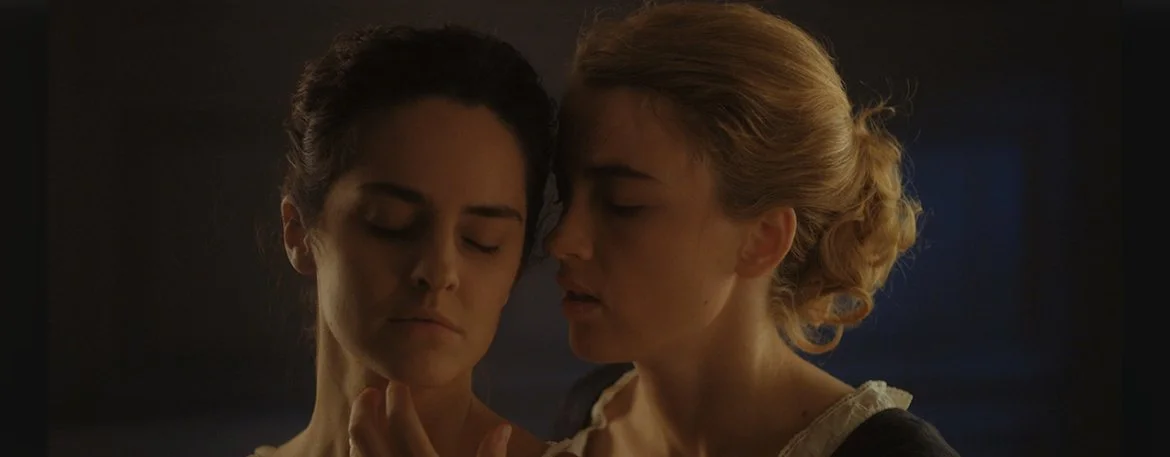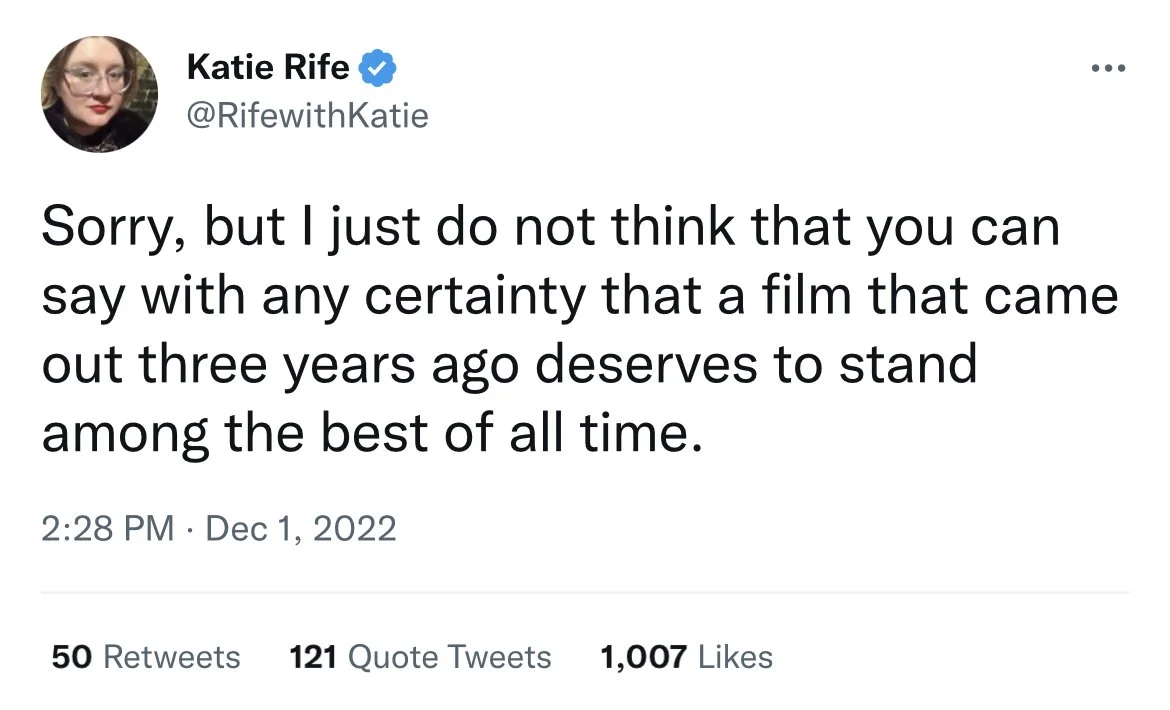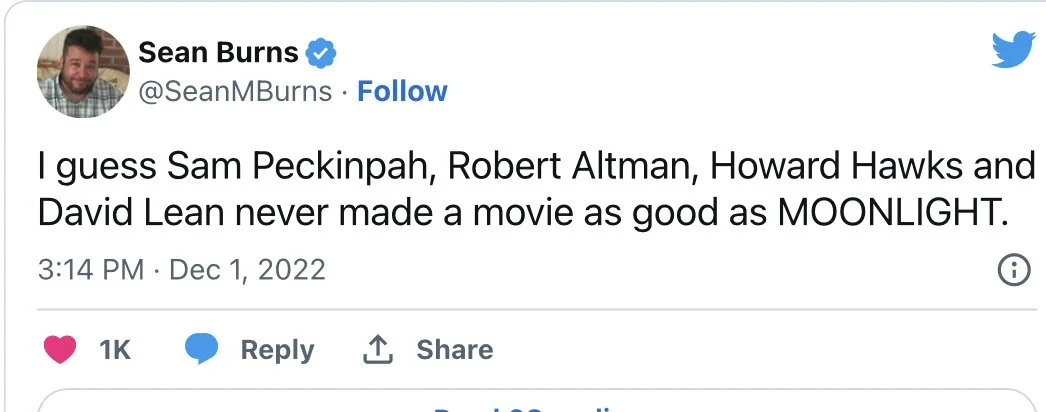Roger Ebert must be weeping somewhere in movie heaven.
Honestly speaking, I expected this. Today’s S&S/BFI poll results make sense. We knew that this list would be so much less well versed in film history given the abhorrent freefall of English film criticism over the last decade. It’s the death of film criticism and the upheaval of political readings of films.
Earlier this year, I begged voters not to politicize the Sight and Sound poll. I felt like it was not just a possibility, but a potential inevitable, that voters would blur the lines between politics and cinema history.
I wrote: “A shake up is no doubt about to occur due to how hyperpoliticized things have become these last 10 years […] If there’s one thing I can plea for, with voters of this decade’s edition of the poll, is to please keep the woke politics out of it. No, “Portrait of a Lady on Fire” and “Moonlight.”
Welcome to my nightmare.
I saw this coming a mile away. You see, nowadays, when a film critic is given the task of making a list, they usually make sure to install a quota behind its making: “does it at least have one female director?” “does it have at least one black director?”
First things first, Chantal Akerman's "Jeanne Dielman" is a great and difficult movie, one of the best ones ever directed by a female filmmaker, and it belongs in anybody's list of the 200 or so greatest films of all-time. With that being said, I believe 'Dielman' jumping 34 spots and becoming Sight and Sound's greatest film of all-time is a result of the above quota.
A big chunk of those polled made their lists with the intention of including at least one female filmmaker within their list of ten, and the de facto choice is and has always been Akerman's film. Et voila, it is now #1 based on that quota.
The same can be said about film Twitter favorites "Moonlight” (#60) "Get Out" (#95) and "Portrait of A Lady on Fire” (#30) all of which broke through via Sight and Sound deciding to expand its voter pool this decade from 800 to nearly 1600 voters, many of which might not be as familiar with film history.
The result is Peele, Sciamma and Jenkins being included in the same ranks as esteemed auteurs such as Renoir, Kubrick, Ozu, and Murnau. Voters opted to include Sciamma, Jenkins and Peele in the top 100. Do we now live in a world where “Moonlight” is ahead of “L'Avventura”, “Casablanca,” “Metropolis” “Journey to Italy” “The Third Man” and “Goodfellas”? I’ll let you answer that question.
In fact, no film directed by Terrence Malick or Paul Thomas Anderson made the top 100. Blasphemy. No Nicholas Ray. No Bunuel. No Polanski. No Rohmer. No Altman. No Lubitsch. Only one Ingmar Bergman film (“Persona”) was included. Films that fell out of the top 100 included landmarks such as “Lawrence of Arabia,” Raging Bull,” Rio Bravo,” “Chinatown,” Touch of Evil,” “The Godfather Part II.,” “Pickpocket,” “La Grande Illusion,” “Gertrud.”
Entering the top 100 were inclusive new entries such as “Killer of Sheep” (#43), “News From Home” (#52),“Daughters of the Dust” (#60) and “Black Girl” (#85).
Amidst all this chaos comes Lynch's "Mulholland Drive" (#8) and Wong's "In the Mood For Love" (#5) entering the top 10. What a remarkabe climb these two have had, both released a little more than 20 years ago and still gaining in significance. Also, Claire Denis’ “Beau Travail” (#7), which was #84 the last time the poll got conducted, had a steep climb up the ranks. Ditto Varda’s “Cleo 5 a 7” and Deren’s “Meshes in the Afternoon,” both of which were not even in the top 100, but are now respectively at #14 and #16.
Coppola's "The Godfather" (#12) also benefited from a younger pool of voters, barely falling short of the top 10, whereas Ford's "The Searchers" (#15) fell out of the top 10, no doubt due to its controversial star, John Wayne. Spike Lee's "Do the Right Thing" was aided by today's fervent political climate, but it’s not a total stretch to believe that it could have one day belonged in the top 25.
Kubrick's "2001: A Space Odyssey” (#6) which many predicted would be the new #1," continued its ascension and will no doubt continue to climb in esteem. It will probably be #1 one day. It did top the far worthier directors’ poll.
The last decade’s top film, Hitchcock's "Vertigo” (#2) managed to fall a single spot and will still very much be in the running to regain the top spot when the next poll occurs in 2032. Maybe then things will have calmed down and people will come to their senses regarding quotas and gender biases.
The Sight and Sound poll has been known to neglect modern-era films throughout its seven decade history, but a change has infiltrated the status quo this time around. A handful of newer films, some released just 3 years ago, made it this time around. What does that say about today's film criticism? Maybe, from now on, it'll be out with the old and in with the new. Or, maybe, the director's list, which seems to be a far worthier list in 2022, will be the more respected one. The directors' poll still adhered to some quotas, where 'Dielman' finished at #2, but there were far less outliers in it.









